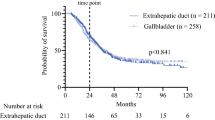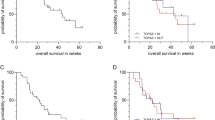Summary
Lanreotide autogel is a long-acting somatostatin analogue with proven efficacy and safety in patients with well-differentiated (WD) gastroenteropancreatic-neuroendocrine tumors (GEP-NETs) in a prior randomized phase III trial (CLARINET). However, the CLARINET study only enrolled patients with Ki-67 index <10%, and few patients of Asian ethnicity were included. We retrospectively analyzed the efficacy and safety of lanreotide in Korean patients with GEP-NETs in the daily practice setting. Between January 2015 and May 2018, 64 patients with metastatic WD GEP-NETs received lanreotide at Asan Medical Center, Seoul, Korea. Of them, 45 (70.3%) patients who received lanreotide as monotherapy were included in the current analysis. The most common primary tumor site was the pancreas (n = 22, 48.9%), followed by the rectum (10, 22.2%) and the small bowel (7, 15.6%). According to RECIST v1.1, a partial response was achieved in one patient (2.2%) and stable disease was achieved in 40 patients (88.9%). The median progression-free survival (PFS) was 16.4 months (95% confidence interval, 9.5–23.3 months). There were no differences in PFS according to the primary tumor site (p = 0.77). Hepatic tumor volume > 25% and prior systemic therapy were significantly associated with poorer PFS in the multivariate analysis. Lanreotide is well-tolerated and effective for Korean patients with GEP-NETs in the daily practice setting.



Similar content being viewed by others
References
Yao JC, Hassan M, Phan A, Dagohoy C, Leary C, Mares JE, Abdalla EK, Fleming JB, Vauthey JN, Rashid A, Evans DB (2008) One hundred years after “carcinoid”: epidemiology of and prognostic factors for neuroendocrine tumors in 35,825 cases in the United States. J Clin Oncol 26:3063–3072. https://doi.org/10.1200/JCO.2007.15.4377
Rinke A, Muller HH, Schade-Brittinger C et al (2009) Placebo-controlled, double-blind, prospective, randomized study on the effect of octreotide LAR in the control of tumor growth in patients with metastatic neuroendocrine midgut tumors: a report from the PROMID study group. J Clin Oncol 27:4656–4663. https://doi.org/10.1200/JCO.2009.22.8510
Yao JC, Shah MH, Ito T, Bohas CL, Wolin EM, van Cutsem E, Hobday TJ, Okusaka T, Capdevila J, de Vries EG, Tomassetti P, Pavel ME, Hoosen S, Haas T, Lincy J, Lebwohl D, Öberg K, RAD001 in Advanced Neuroendocrine Tumors, Third Trial (RADIANT-3) Study Group (2011) Everolimus for advanced pancreatic neuroendocrine tumors. N Engl J Med 364:514–523. https://doi.org/10.1056/NEJMoa1009290
Yao JC, Fazio N, Singh S, Buzzoni R, Carnaghi C, Wolin E, Tomasek J, Raderer M, Lahner H, Voi M, Pacaud LB, Rouyrre N, Sachs C, Valle JW, Fave GD, van Cutsem E, Tesselaar M, Shimada Y, Oh DY, Strosberg J, Kulke MH, Pavel ME, RAD001 in Advanced Neuroendocrine Tumours, Fourth Trial (RADIANT-4) Study Group (2016) Everolimus for the treatment of advanced, non-functional neuroendocrine tumours of the lung or gastrointestinal tract (RADIANT-4): a randomised, placebo-controlled, phase 3 study. Lancet 387:968–977. https://doi.org/10.1016/S0140-6736(15)00817-X
Yoo C, Cho H, Song MJ, Hong SM, Kim KP, Chang HM, Chae H, Kim TW, Hong YS, Ryu MH, Kang YK, Kim SC, Ryoo BY (2016) Efficacy and safety of everolimus and sunitinib in patients with gastroenteropancreatic neuroendocrine tumor. Cancer Chemother Pharmacol 79:139–146. https://doi.org/10.1007/s00280-016-3215-3
Raymond E, Dahan L, Raoul J-L, Bang YJ, Borbath I, Lombard-Bohas C, Valle J, Metrakos P, Smith D, Vinik A, Chen JS, Hörsch D, Hammel P, Wiedenmann B, van Cutsem E, Patyna S, Lu DR, Blanckmeister C, Chao R, Ruszniewski P (2011) Sunitinib malate for the treatment of pancreatic neuroendocrine tumors. N Engl J Med 364:501–513. https://doi.org/10.1056/NEJMoa1003825
Pavel M, O'Toole D, Costa F et al (2016) ENETS consensus guidelines update for the Management of Distant Metastatic Disease of intestinal, pancreatic, bronchial neuroendocrine neoplasms (NEN) and NEN of unknown primary site. Neuroendocrinology 103:172–185. https://doi.org/10.1159/000443167
Kunz PL, Reidy-Lagunes D, Anthony LB et al (2013) Consensus guidelines for the management and treatment of neuroendocrine tumors. Pancreas 42:557–577
Caplin ME, Pavel M, Ćwikła JB, Phan AT, Raderer M, Sedláčková E, Cadiot G, Wolin EM, Capdevila J, Wall L, Rindi G, Langley A, Martinez S, Blumberg J, Ruszniewski P, CLARINET Investigators (2014) Lanreotide in metastatic Enteropancreatic neuroendocrine tumors. N Engl J Med 371:224–233. https://doi.org/10.1056/NEJMoa1316158
Ito T, Honma Y, Hijioka S, Kudo A, Fukutomi A, Nozaki A, Kimura Y, Motoi F, Isayama H, Komoto I, Hisamatsu S, Nakajima A, Shimatsu A (2017) Phase II study of lanreotide autogel in Japanese patients with unresectable or metastatic well-differentiated neuroendocrine tumors. Investig New Drugs 35:499–508. https://doi.org/10.1007/s10637-017-0466-8
Inzani F, Petrone G, Rindi G (2018) The New World health organization classification for pancreatic neuroendocrine neoplasia. Endocrinol Metab Clin N Am 47:463–470. https://doi.org/10.1016/j.ecl.2018.04.008
Martín-Richard M, Massutí B, BMC EP (2013) Antiproliferative effects of lanreotide autogel in patients with progressive, well-differentiated neuroendocrine tumours: a Spanish, multicentre, open-label. BMC Cancer. https://doi.org/10.1186/1471-2407-13-427
Caplin ME, Pavel M, Ćwikła JB, Phan AT, Raderer M, Sedláčková E, Cadiot G, Wolin EM, Capdevila J, Wall L, Rindi G, Langley A, Martinez S, Gomez-Panzani E, Ruszniewski P, CLARINET Investigators (2016) Anti-tumour effects of lanreotide for pancreatic and intestinal neuroendocrine tumours: the CLARINET open-label extension study. Endocr Relat Cancer 23:191–199. https://doi.org/10.1530/ERC-15-0490
Palazzo M, Lombard-Bohas C, Cadiot G, Matysiak-Budnik T, Rebours V, Vullierme MP, Couvelard A, Hentic O, Ruszniewski P (2013) Ki67 proliferation index, hepatic tumor load, and pretreatment tumor growth predict the antitumoral efficacy of lanreotide in patients with malignant digestive neuroendocrine tumors. Eur J Gastroenterol Hepatol 25:232–238. https://doi.org/10.1097/MEG.0b013e328359d1a6
Tsai H-J, Wu C-C, Tsai C-R, Lin SF, Chen LT, Chang JS (2013) The epidemiology of neuroendocrine tumors in Taiwan: a nation-wide cancer registry-based study. PLoS One 8:e62487. https://doi.org/10.1371/journal.pone.0062487
Cho M-Y, Kim JM, Sohn JH et al (2012) Current trends of the incidence and pathological diagnosis of Gastroenteropancreatic neuroendocrine tumors (GEP-NETs) in Korea 2000-2009: multicenter study. Cancer Res Treat 44:157–165. https://doi.org/10.4143/crt.2012.44.3.157
Frilling A, Modlin IM, Kidd M, Russell C, Breitenstein S, Salem R, Kwekkeboom D, Lau WY, Klersy C, Vilgrain V, Davidson B, Siegler M, Caplin M, Solcia E, Schilsky R, Working Group on Neuroendocrine Liver Metastases (2013) Recommendations for management of patients with neuroendocrine liver metastases. Lancet Oncol 15:e8–e21. https://doi.org/10.1016/S1470-2045(13)70362-0
Author information
Authors and Affiliations
Corresponding authors
Ethics declarations
Conflicts of interest
The authors have no competing financial interests to declare.
Statement of ethics
All procedures performed in studies involving human participants were in accordance with the ethical standards of the institutional and/or national research committee and with the 1964 Helsinki declaration and its later amendments or comparable ethical standards.
Informed consent
For this type of study, formal consent is not required.
Rights and permissions
About this article
Cite this article
Kang, J., Yoo, C., Hwang, HS. et al. Efficacy and safety of lanreotide in Korean patients with metastatic, well-differentiated gastroenteropancreatic-neuroendocrine tumors: a retrospective analysis. Invest New Drugs 37, 763–770 (2019). https://doi.org/10.1007/s10637-018-0710-x
Received:
Accepted:
Published:
Issue Date:
DOI: https://doi.org/10.1007/s10637-018-0710-x




